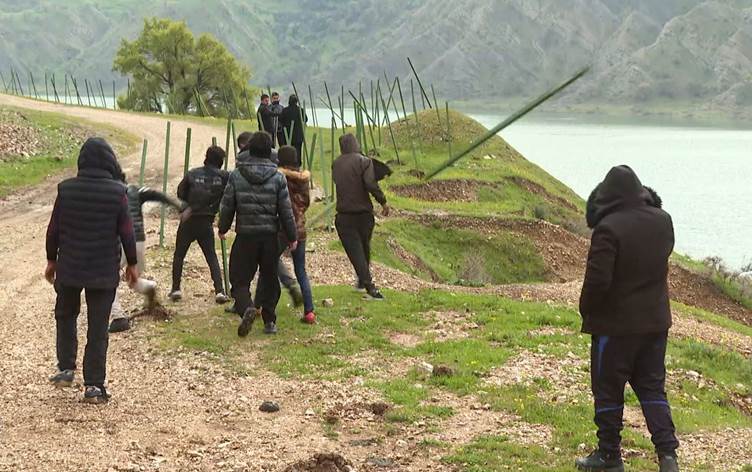ERBIL, Kurdistan Region - The Iraqi government’s decision to close the border with Iran by setting up a fence has sparked protests from locals who fear the decision will negatively impact their farming and livestock raising activities.
The barbed wire fence to be erected at the border was recently commissioned by the Iraqi federal government as part of the security agreement with Iran in an effort to meet security concerns raised by Tehran.
"Since the 1988 chemical attack, not even one single bullet has been shot from here," Hamid Kawtayi, a farmer from Halabja's Kawta village told Rudaw.
Teenagers with covered faces removed some of the iron poles put in place by workers who are believed to have been assigned the task by the Iraqi government. A local said the workers spoke in Arabic and no one had consulted the village leaders regarding the new border fence.
Kawtayi stressed that people living on both sides of the border share familial ties, adding that Iraqi border guards have also denied tourists access to the area.
Kawta is located southwest of Halabja city and is separated from Iran by the Sirwan river. The river has for long represented the natural border between the two countries, but the new fence would push the villages on the side of the Kurdistan Region further back, effectively creating a security buffer zone.
"If this place is fenced, we can no longer live here," Abdulrahman Husen, another farmer told Rudaw. "We would not have any more pastures."
Sabur Ahmad, a local beekeeper who keeps his bees on the bank of Sirwan river, said the new plan means that he will no longer be able to tend to his beehives.
"Our pasture area is also located on the bank, cows for example cannot climb the mountain," he said.
"We have no option but to desert the village," he added.
Chro Sharif, member of the Iraqi parliament who also attended the local protest, told Rudaw that Halabja lawmakers have promptly informed the Iraqi government about the locals’ discontent.
"The majority of people in the area farm and raise livestock. Some use their land for farming, others for tourism. We have told the Iraqi prime minister to halt the construction of this fence until the government has listened to the demands of the people," the MP told Rudaw.
The security pact signed between Iran and Iraq in March 2023 saw Baghdad agree to disarm Iranian-Kurdish opposition groups and secure the border regions. Iran had threatened to use military action if Baghdad failed to fulfill the agreement.
The barbed wire fence to be erected at the border was recently commissioned by the Iraqi federal government as part of the security agreement with Iran in an effort to meet security concerns raised by Tehran.
"Since the 1988 chemical attack, not even one single bullet has been shot from here," Hamid Kawtayi, a farmer from Halabja's Kawta village told Rudaw.
Teenagers with covered faces removed some of the iron poles put in place by workers who are believed to have been assigned the task by the Iraqi government. A local said the workers spoke in Arabic and no one had consulted the village leaders regarding the new border fence.
Kawtayi stressed that people living on both sides of the border share familial ties, adding that Iraqi border guards have also denied tourists access to the area.
Kawta is located southwest of Halabja city and is separated from Iran by the Sirwan river. The river has for long represented the natural border between the two countries, but the new fence would push the villages on the side of the Kurdistan Region further back, effectively creating a security buffer zone.
"If this place is fenced, we can no longer live here," Abdulrahman Husen, another farmer told Rudaw. "We would not have any more pastures."
Sabur Ahmad, a local beekeeper who keeps his bees on the bank of Sirwan river, said the new plan means that he will no longer be able to tend to his beehives.
"Our pasture area is also located on the bank, cows for example cannot climb the mountain," he said.
"We have no option but to desert the village," he added.
Chro Sharif, member of the Iraqi parliament who also attended the local protest, told Rudaw that Halabja lawmakers have promptly informed the Iraqi government about the locals’ discontent.
"The majority of people in the area farm and raise livestock. Some use their land for farming, others for tourism. We have told the Iraqi prime minister to halt the construction of this fence until the government has listened to the demands of the people," the MP told Rudaw.
The security pact signed between Iran and Iraq in March 2023 saw Baghdad agree to disarm Iranian-Kurdish opposition groups and secure the border regions. Iran had threatened to use military action if Baghdad failed to fulfill the agreement.








Comments
Rudaw moderates all comments submitted on our website. We welcome comments which are relevant to the article and encourage further discussion about the issues that matter to you. We also welcome constructive criticism about Rudaw.
To be approved for publication, however, your comments must meet our community guidelines.
We will not tolerate the following: profanity, threats, personal attacks, vulgarity, abuse (such as sexism, racism, homophobia or xenophobia), or commercial or personal promotion.
Comments that do not meet our guidelines will be rejected. Comments are not edited – they are either approved or rejected.
Post a comment